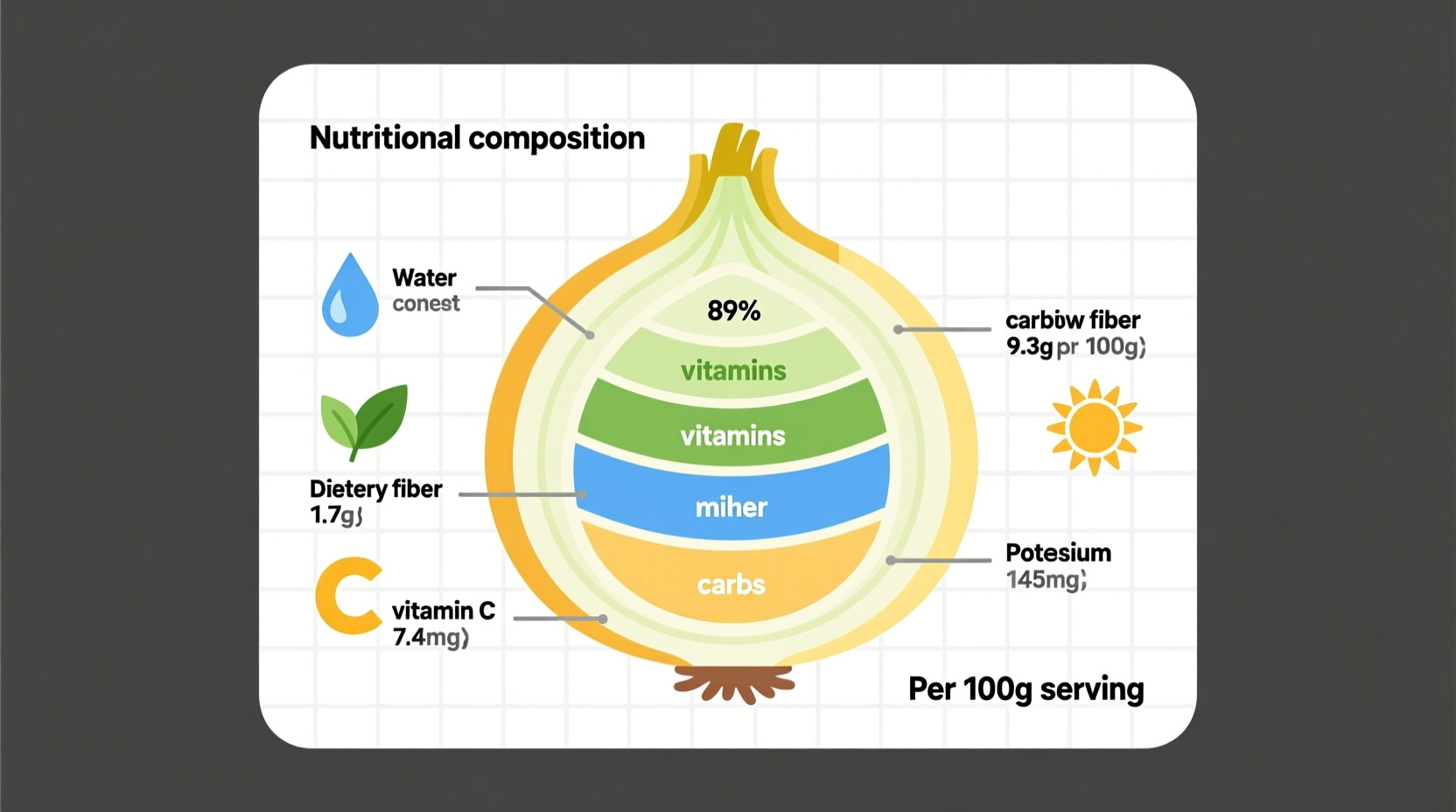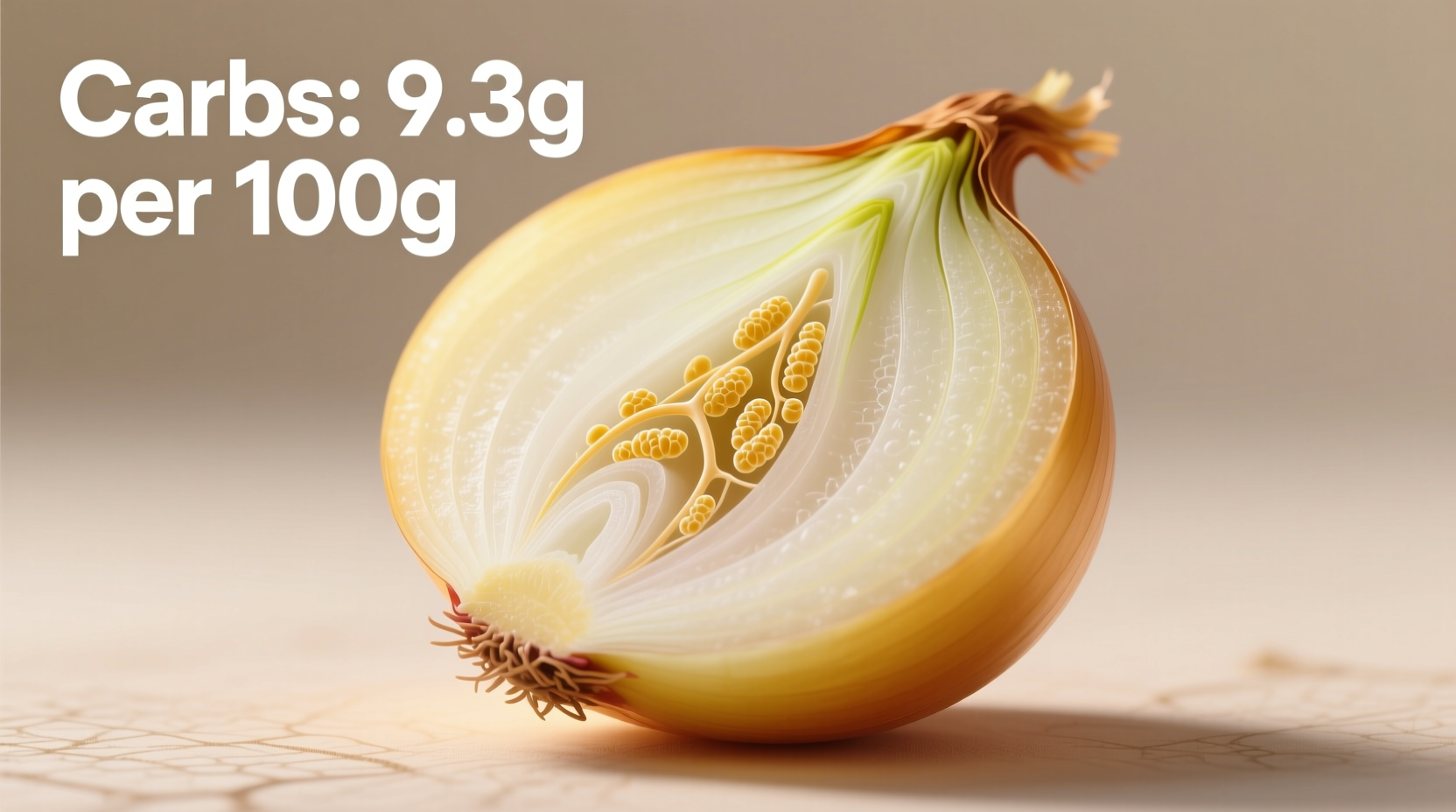One medium yellow onion (110g) contains 9.3g total carbohydrates, with 1.9g dietary fiber and 5.5g natural sugars. This gives a net carb count of 7.4g per medium onion, making yellow onions a moderate-carb vegetable suitable for most balanced diets.
Understanding the carbohydrate composition of yellow onions helps you make informed dietary choices whether you're managing blood sugar, following a specific eating plan, or simply curious about this kitchen staple's nutritional profile. Let's explore exactly what you're getting when you reach for that yellow onion in your pantry.
Breaking Down Yellow Onion Carbohydrates
Yellow onions, the workhorse of most kitchens, offer more than just flavor—they deliver valuable nutrients within their carbohydrate profile. According to the USDA FoodData Central database, the most authoritative source for nutritional information, here's the precise carbohydrate breakdown for a medium yellow onion (110g):
| Carbohydrate Type | Amount per Medium Onion (110g) | Percentage of Daily Value* |
|---|---|---|
| Total Carbohydrates | 9.3g | 3% |
| Dietary Fiber | 1.9g | 7% |
| Sugars | 5.5g | - |
| Net Carbs (Total Carbs - Fiber) | 7.4g | - |
*Based on a 2,000 calorie diet. Daily Value percentages are for general reference.
This nutritional composition explains why yellow onions provide that characteristic sweet flavor when cooked, especially when caramelized—their natural sugars transform through the Maillard reaction. The fiber content contributes to digestive health while helping moderate the impact on blood sugar levels.
Yellow Onion Carbs in Context: How They Compare
Understanding yellow onion carbohydrates becomes more valuable when compared to other common onion varieties. The USDA's comprehensive food composition database reveals interesting differences:
| Onion Type | Total Carbs (per 100g) | Fiber (per 100g) | Sugars (per 100g) |
|---|---|---|---|
| Yellow Onion | 9.3g | 1.7g | 5.0g |
| White Onion | 8.5g | 1.6g | 4.2g |
| Red Onion | 9.0g | 1.7g | 4.7g |
| Green Onions (Scallions) | 7.3g | 2.6g | 2.8g |
| Shallot | 17.0g | 3.2g | 7.9g |
As shown in this comparison, yellow onions contain slightly more carbohydrates than white or red varieties but significantly fewer than shallots. This factual comparison helps explain why shallots taste noticeably sweeter and why green onions might be preferable for those strictly monitoring carb intake.
How Cooking Affects Yellow Onion Carbohydrates
Many home cooks wonder whether cooking changes the carbohydrate content of yellow onions. Research published in the Journal of Agricultural and Food Chemistry confirms that while the total carbohydrate amount remains relatively stable, the composition shifts during cooking:
- Raw yellow onions maintain their full fiber content and have a glycemic index of approximately 10-15
- Sautéed onions experience minimal carb changes but become slightly more digestible
- Caramelized onions undergo the Maillard reaction, converting some complex carbohydrates to simpler sugars, increasing perceived sweetness
- Roasted onions develop deeper flavors while maintaining similar carb counts to raw
Understanding these context boundaries helps explain why caramelized onions taste sweeter despite containing the same total carbohydrates as raw onions—the cooking process transforms how those carbohydrates interact with your taste receptors.

Yellow Onions and Blood Sugar Management
For those monitoring blood sugar, yellow onions offer a favorable carbohydrate profile. With a low glycemic load of approximately 1-2 per medium onion, they have minimal impact on blood glucose levels. The American Diabetes Association recognizes onions as a non-starchy vegetable that can be included freely in diabetes meal plans.
The fiber content in yellow onions (1.9g per medium onion) contributes to this favorable blood sugar response by slowing carbohydrate absorption. Additionally, onions contain quercetin and other flavonoids that research suggests may improve insulin sensitivity.
Practical Applications for Different Dietary Needs
Understanding yellow onion carbohydrates helps you incorporate them strategically into various eating patterns:
For Low-Carb and Keto Dieters
With 7.4g net carbs per medium onion, yellow onions can fit within moderate low-carb plans but may need portion control for strict keto diets (typically limited to 20-50g net carbs daily). Consider using half an onion (3.7g net carbs) in recipes or substituting with green onions (lower carb option) when minimizing carb intake.
For Balanced Eating and General Health
For most people, the carbohydrate content in yellow onions presents no concerns. In fact, the combination of fiber, vitamins, and beneficial compounds makes them a valuable component of a healthy diet. The World Health Organization recommends consuming 20-35g of fiber daily, and onions contribute meaningfully to this goal.
Culinary Tips to Maximize Benefits
To get the most nutritional value from yellow onions while managing carbohydrate intake:
- Use raw onions in salads to preserve maximum fiber content
- When caramelizing, cook slowly over medium-low heat to develop flavor without excessive sugar concentration
- Pair onions with healthy fats like olive oil to enhance absorption of fat-soluble nutrients
- Save onion skins for broth—they contain concentrated antioxidants without adding significant carbs
Common Misconceptions About Onion Carbs
Several myths persist about onion carbohydrates that deserve clarification based on current nutritional science:
- "Onions are high in sugar" - While onions contain natural sugars (5.5g per medium onion), this is less than many fruits and even some vegetables like carrots. The sugar content is part of what makes onions nutritionally valuable.
- "Cooking removes all carbs from onions" - Cooking changes the form but not the total amount of carbohydrates. Caramelization concentrates flavors but doesn't eliminate carbs.
- "All onion varieties have identical carb counts" - As shown in our comparison table, different onion types have varying carbohydrate profiles, with shallots containing nearly double the carbs of yellow onions.
These clarifications help separate fact from fiction when considering yellow onion carbohydrates in your diet.
Conclusion: Making Informed Choices with Yellow Onions
Yellow onions provide a moderate carbohydrate profile that fits well within most dietary patterns. With 9.3g total carbs and 7.4g net carbs per medium onion, they offer valuable fiber and nutrients without excessive carbohydrate load. Understanding these facts helps you incorporate yellow onions strategically whether you're managing specific dietary needs or simply enjoying their culinary versatility.
By focusing on portion sizes and preparation methods, you can enjoy the distinctive flavor and health benefits of yellow onions while staying within your personal carbohydrate goals. Remember that the natural sugars in onions contribute to their culinary value and nutritional profile, making them a worthwhile component of a balanced diet for most people.











 浙公网安备
33010002000092号
浙公网安备
33010002000092号 浙B2-20120091-4
浙B2-20120091-4